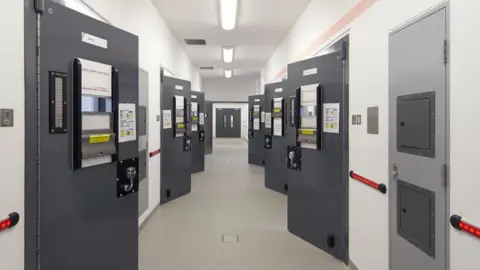Prisoners could be held in police cells to cut overcrowding
 Getty Images
Getty ImagesAbout 400 police cells will be used to temporarily hold inmates after an "acute and sudden increase" in the prison population.
The justice minister said there was a "highly unusual" surge of more than 800 prisoners in the last two months.
Speaking in the Commons, Damian Hinds said the overcrowding was partly due to a backlog of outstanding court cases.
Labour's Ellie Reeves blamed "shambolic" government for the prison service's problems.
Mr Hinds said the overcrowding issue was limited to male prisons and there was "ample" space in women's and youth prisons.
The justice minister said the protocol, known as Operation Safeguard and last used in 2008, was meant for times of "high demand".
He said: "It is the first time ever we have seen that sort of increase for two consecutive months."
Mr Hinds told MPs the overcrowding in jails was partly due to the impact of strike action by criminal barristers over the summer.
He said: "With court hearings resuming, we are seeing a surge in offenders coming through the criminal justice system, placing capacity pressure on adult male prisons in particular."
The government had written to the National Police Chiefs to request the temporary use of police cells, Mr Hinds said.
He added that Operation Safeguard was "not an unprecedented move" and would provide the immediate additional capacity to ensure the "smooth running" of the prison estate.
The Criminal Bar Association, who represent criminal barristers, disputed the minister's claims saying that the remand prison population was already at a decade high of more than 13,000 before they went on strike.
Kirsty Brimelow KC chair of the Criminal Bar Association, said there were "insufficient barristers to prosecute and defend in cases" because they had left "due to poor legal aid pay and abysmal working conditions".
She said the system is currently on "track for further crisis" and instead of blaming barristers "it is of public benefit to remedy the chronic neglect of the criminal justice system".
Responding to Mr Hinds in the Commons, Labour's Ms Reeves said problems in the prison service were a "failure on law and order" and "another crisis created by this shambolic Tory government".
Prisons are "failing in so many ways", the shadow justice minister said. She referenced Exeter Prison, which last week was found to have the worst rates of self-harm in England and Wales.
The Prison Governors' Association, meanwhile, warned the plan would cost the taxpayer more and said the circumstances were "not unforeseen".
It would also "inevitably reduce the available numbers of police personnel to attend their core, front line duties", the organisation added.

Prison population figures in England and Wales
- There are currently about 83,000 people in prisons
- At the start of the coronavirus pandemic there were some 10,000 people on remand
- This rose to about 13,000 in April 2022, before criminal barristers went on strike
- The total number on remand is now about 14,000

In February the government said 4,000 new prison places would be created as part of plans to increase capacity after it committed in 2021 to 20,000 by the middle of the decade.
In the Commons, Justice Committee chairman Sir Robert Neill said prison numbers had "risen exponentially".
He also suggested there could be reason to reconsider whether it was "appropriate" to hold non-violent offenders in custody.
Mr Hinds said it was "very important" to look at options other than custodial sentences, but said part of the reason for the rise in numbers was "tougher sentences for the worst offences".
Plaid Cymru Westminster leader Liz Saville Roberts said using police cells to house prisoners showed an "utter failure" of policy.
The National Police Chiefs Council (NPCC) said contingency plans were in place to launch the temporary measure and policing would "continue to conduct its operational business".
Deputy Chief Constable Nev Kemp said the NPCC would work with the government to ensure arrangements were as "safe and efficient as possible".
The Ministry of Justice said the public would "rightly expect" the government to take the necessary action to create extra spaces for prisoners.
Keeping the public safe and cutting crime "remains our number one priority", it added.
